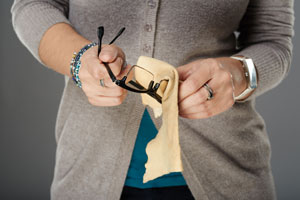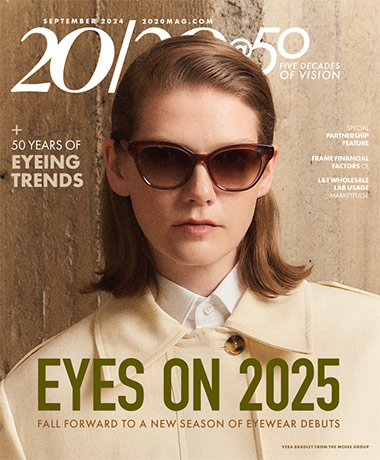
Many of us in the optical market have developed a natural tendency to pay attention to the eyeglasses another person is wearing – whether the frame, the lenses, or how the glasses fit the consumer. It’s a natural by product of our passion, of what we do daily. Having focused on eyeglass lens care for years, I pay particular attention to the condition of one’s lenses. I always have several pre-moistened towelettes with me for cleaning convenience and must admit I will find ways to work in a bit of a product pitch when I am speaking to someone with horribly dirty lenses. They’re truly a distraction!

Several years ago, I was flying out to Las Vegas for Vision Expo and was seated next to a woman who was interested in talking. I had been reviewing some information for upcoming meetings but took the time to converse with her for a bit. Did the smudge-filled lenses she was sporting have something to do with it? I’m sure it contributed. As she was telling me what she had planned for the weekend, it was time for me to clean my glasses as the fingerprint in the corner was a nuisance. The conversation shifted to why I was headed to Vegas, and I told her about the show and what I do.
It was music to my ears when she told me she purchases two pairs every year. She even had both with her. The industry would be proud. Two pairs. An annual exam. She was sizing up to be our poster woman. I then offered her several towelettes to keep her lenses clean throughout the weekend. She declined. She told me she doesn’t clean her glasses. What?! Granted, the fact that she didn’t clean them was evident by the condition of her lenses, but never clean? Our poster child was gone.
I just had to uncover her reasoning. While she buys two pairs every year, she believes because she gets both pairs for under $100, the glasses are disposable. She doesn’t need to care for them because she knows she’s buying two new pairs next year. She did tell me her optician does offer her lens cleaner (yay!), but she always declines. And she’s even had lenses replaced multiple times at no charge when the scratches were so bad. Tried as I did about appearance, image, and simply seeing clearly, she was dead set against cleaning. I was crushed.

As our conversation came to an end, I turned back to the work I was reviewing but spent some time reflecting on our conversation. While we as an industry may have reached this woman about annual exams and multiple pairs, we didn’t fully connect on why caring for the eyeglasses is important. To her, it wasn’t. Did she honestly not care about her appearance? Had she figured out a way to beat the system, so to speak, with having her lenses remade? Did the two pairs for under $100 take into account the overall costs of remaking the lenses, from time spent with the patient to the physical product costs themselves? Is this customer costing us money?
We can’t make a person take care of their eyewear, but we sure can have the conversation with EVERY one as to why glasses should be cared for. Not only does selling lens cleaner add profits; it also improves the overall customer satisfaction. It can also help reduce remakes when care becomes a habit. When you remember that our industry is a blend of medical and fashion, taking care of lenses serves the needs of both.

Jodi Groh is a marketing professional with 20 years experience in the optical community. An expert in lens care, she is passionate about growing business at the customer level. She is an ABO speaker and has been recognized as one of Vision Monday’s Influential Women in Optical.










